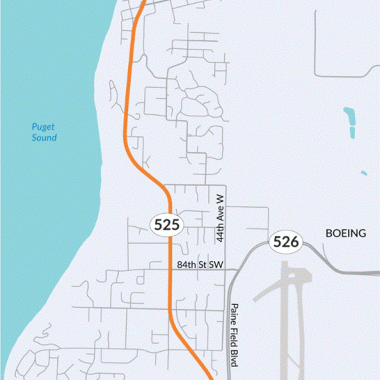Project overview
This project will repave, with Hot Mix Asphalt (HMA), and construct Americans with Disability Act (ADA) upgrades on State Route 525 from the SR 525 Spur Vic to Mukilteo Ferry Terminal. This project is subject to WSDOT’s Complete Streets requirements. Additionally, the paving project was awarded a $1.5 million dollar grant for construction that requires construction begin in Spring 2026. We will be working to incorporate as much active transportation facilities as feasible with the paving construction, but due to the short timeframe to deliver the paver and ADA upgrades, it is likely some active transportation facilities needed to meet the complete streets requirement will be constructed by a later project.
The limits of this project overlap with the SR 525 Mukilteo Bridge Over Railroad – Bridge Replacement project. Due to their proximity, the Complete Streets Pre-Design phase of both projects will be combined. This will result in a cohesive vision for the SR 525 corridor that reflects input from the community, local agencies, tribes and other interested parties. Despite this consolidation, these projects may be constructed separately or in phases.
What to expect
This project is in the early stages of design. Travelers should not expect to see construction in the area. The Complete Streets Pre-design phase is scheduled to take place between spring 2024-summer 2025. The pre-design process will include several meetings, events, and other engagement with interested parties and the public to seek input on the design of the new SR 525 bridge and SR 525 within the project limits. The paving and ADA upgrades pre-design and design will be completed on a parallel accelerated timeline to meet the spring 2026 funding deadline.
Environmental justice assessment
An Environmental Justice Assessment (EJA) will be completed for the SR 525/ SR 525 Spur Vic to Mukilteo Ferry Terminal – HMA Paving and ADA Compliance project. These assessments are conducted for Significant Agency Actions (SAAs) that could harm the environment or impact how environmental benefits are distributed to Overburdened Communities (OBCs) or Vulnerable Populations (VPs). SAAs are actions initiated after July 1, 2023, and consist of WSDOT transportation projects and grants of $15 million or more, new grant or loan programs, agency request legislation and rulemaking. An EJA guides decision-making to ensure fair distribution of environmental benefits, reduce environmental harms, and address disparities in both environmental and health outcomes. Meaningful engagement with affected communities is a crucial aspect of this process.
This project will repave and construct ADA upgrades on SR 525 from SR 525 Spur Vic (milepost 5.72) to Mukilteo Ferry Terminal (milepost 8.47). The project will incorporate as much active transportation facilities to meet WSDOT’s complete streets requirement as feasible.
SR 525 is due to be repaved as part of WSDOT’s ongoing preservation program. As required by 28 CFR Part 35, ADA upgrades will also be constructed to meet current ADA standards to the maximum extent feasible.
Community engagement
Listening sessions
Listening Sessions are being planned for fall 2024 to hear about transportation challenges and needs and transportation preferences. These sessions will include community-based organizations and other interested parties.
Online Open House and Survey
Community feedback will be sought during an online open house and survey planned for late 2024/early 2025.
Summer 2025 Online Open House
June 9 - July 13, 2025
Summary (PDF 4.2MB)
Working groups
Technical Working Group (TWG)
The TWG consists of public works, engineering, and planning staff from local, regional, state and tribal entities. The TWG serves in an advisory role to WSDOT providing technical feedback at multiple steps in the pre-design process.
Technical Working Group Meeting 1
Monday, October 7, 2024
Presentation (PDF 8.2MB)
Summary (PDF 171KB)
Technical Working Group Meeting 2
Monday, December 16, 2024
Presentation (PDF 9MB)
Summary (PDF 179KB)
Technical Working Group Meeting 3
Wednesday, September 10, 2025
Presentation (PDF 5.7MB)
Executive Working Group (EWG)
The EWG consists of elected officials, chairs and executives from local, regional, state, business and tribal entities. The EWG serves in an advisory role to WSDOT providing policy feedback at multiple steps in the pre-design process.
Executive Working Group Meeting 1
Monday, May 5, 2025
Presentation (PDF 4.1MB)
Summary (PDF 207KB)
Complete streets
The Complete Streets legislation was passed in 2022, in Washington Senate Bill 5974. Using the WSDOT’s Complete Streets approach,
this project will go through a Complete Streets Pre-design phase to determine the SR 525 corridor cross-section between milepost 5.72 to 8.47. The cross-section includes lanes for cars, buses, and trucks and facilities for bicyclists and pedestrians, all in one plan. The pre-design phase of the project will include significant community engagement to understand the needs of tribes, overburdened communities, multimodal users, ferry passengers, residents, and other interested parties in the area.
The intent of the SR 525/ SR 525 Spur Vic to Mukilteo Ferry Terminal – HMA Paving and ADA Compliance - Complete Streets Pre-Design phase is to create a corridor that accommodates all users (pedestrians, bicyclists, transit users, and motor vehicle drivers) as well as provide improved connections to key destinations including the Washington State Ferries (WSF) Mukilteo Ferry Terminal, Sound Transit Mukilteo Sounder North station, parks, businesses, and neighborhood services. The public and interested parties will have opportunities to give input on the design of the new SR 525 bridge and SR 525 corridor within the project limits.
Healthy Environment for All (HEAL) Act
This project is also subject to Washington's environmental justice law, known as the Healthy Environment for All (HEAL) Act. Environmental justice in Washington state, as provided in the HEAL Act, addresses disproportionate environmental and health impacts in all laws, rules, and policies by prioritizing vulnerable populations and overburdened communities, the equitable distribution of resources and benefits, and eliminating harm (RCW 70A.02.010).

